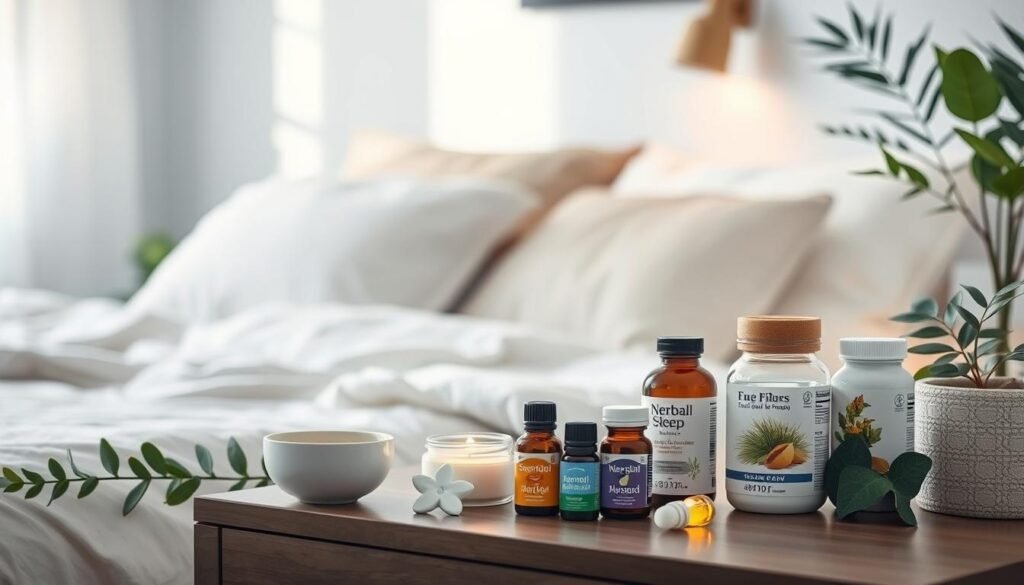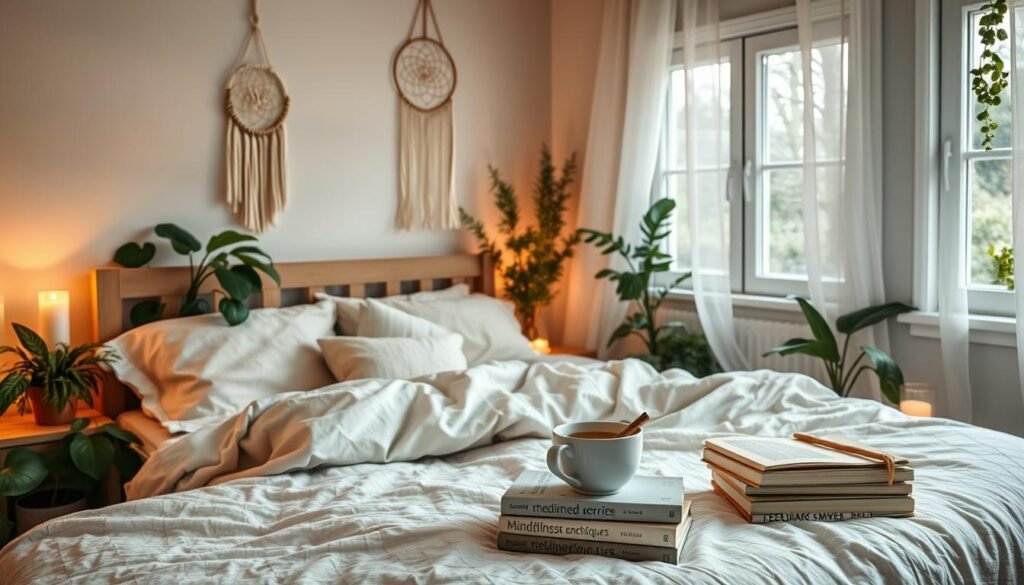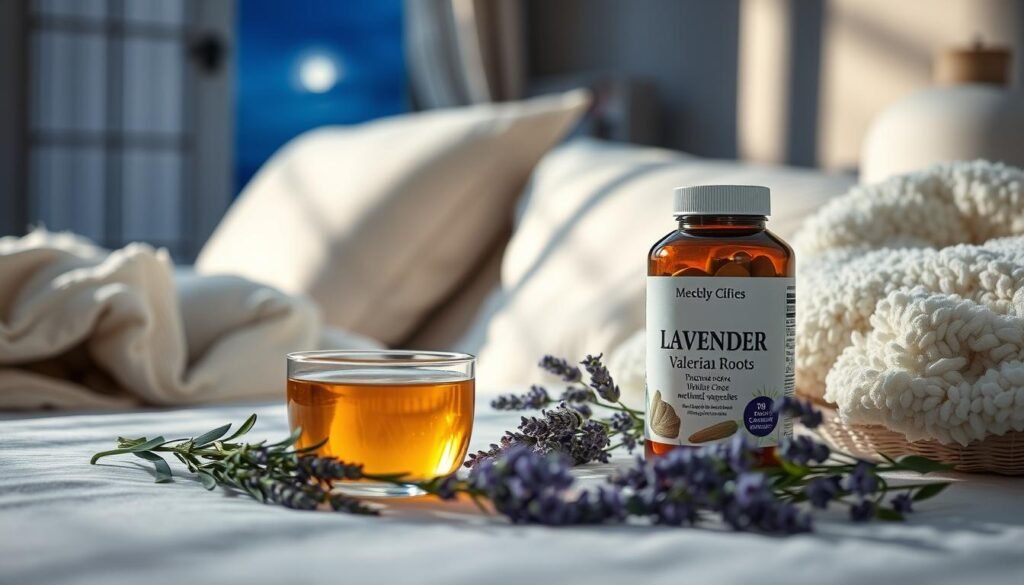Did you know that 19% to 50% of clinic patients with other conditions also have insomnia? This fact shows how important it is to find good solutions for sleep. Many use Seroquel (quetiapine), aimed at treating schizophrenia and bipolar disorder, for sleep. But research points to better alternatives that can improve sleep without the downsides of drugs.
Studies highlight that patients taking trazodone got more sleep and woke up less than those on quetiapine. So, it’s key to look into other options for better sleep than Seroquel. We’ll look at non-drug methods and lifestyle tweaks to help sleep better.
Key Takeaways
- Many patients being treated for different issues also suffer from insomnia.
- Seroquel might not be the best for sleep problems due to its side effects.
- Trazodone could lead to better sleep with fewer interruptions at night.
- Natural methods and therapies can improve sleep without depending on meds.
- Behavior therapies can really help solve insomnia for better sleep over time.
Understanding Seroquel and its Role in Sleep
Seroquel, also known as quetiapine, is popular for sleep issues. It works on the brain’s serotonin and dopamine, helping with sleep. In the US, Australia, New Zealand, and the UK, more people use it for insomnia.
Its role in sleep treatment is growing. According to a US survey, it’s the fourth most-used sleep aid. Seroquel comes in different doses. High doses treat schizophrenia, medium doses are for mood disorders, and low doses help with sleep.
Yet, there are side effects to consider like weight gain and dizziness. Long-term use might lead to more serious health issues. If you’re considering Seroquel for sleep, talk to a doctor first. For more on dosage, check out this guide on Seroquel for insomnia.
https://www.youtube.com/watch?v=a4LgPQNXKzo&pp=ygUJI25leGl0b2xz
Why Consider Alternatives to Seroquel?
People often use Seroquel to help with sleep problems. However, they may face issues like fatigue, weight gain, and changes in metabolism. These side effects create a need to find safer sleep alternatives.
The risk of long-term health problems with Seroquel is worrying. This concern has led to the search for different options.
More doctors are prescribing antipsychotic drugs like quetiapine now. But, studies show many quetiapine users don’t have psychiatric issues. This fact raises questions about why it’s used for problems like insomnia.
Looking for other options can reduce bad side effects and improve health. Many adults struggle with sleep issues, showing a need for better solutions. Things like herbal supplements and cognitive behavioral therapy offer safer relief.

Alternatives to Seroquel for Better Sleep
People looking for better sleep can consider many options besides usual medicines like Seroquel. Options that don’t involve drugs are becoming popular for improving sleep quality. They allow people to get better sleep without the risks that medications can bring.
Overview of Non-Pharmaceutical Solutions
There are non-drug ways to deal with sleep problems. These include changing your lifestyle, relaxing more, and using natural supplements. Choices like sleep hygiene, cognitive behavioral therapy (CBT), and being mindful help. They make sleep better without the bad effects that come with usual medicines. For example, cognitive behavioral therapy is effective in treating insomnia. It helps people sleep better without using drugs.
Comparative Effectiveness of Alternatives
Different non-prescription aids like trazodone and melatonin can work better than some drugs for sleep. Studies show people using trazodone slept longer and woke up less at night than those on Seroquel. Though, some felt stomach side effects. Natural supplements, like valerian root, work differently for everyone. Some may feel side effects such as headaches and weakness.
It’s key to carefully think about all the choices. Doing so helps weigh the good points and risks of each option. Many sleep solutions work well if they match what a person needs. This way, one can steer clear of common medication issues.

Natural Sleep Aids
Many people look for natural ways to improve their sleep. Herbal supplements like valerian root, passionflower, and chamomile tea are popular. They are known for helping to make sleep better without the downsides of prescription drugs.
Herbal Supplements for Sleep
Valerian and passionflower are key in non-medicinal sleep help. Valerian root is famous for making people calm, and studies suggest it helps with insomnia. Passionflower tea may also enhance sleep. Chamomile tea is especially good for new moms, aiding sleep and lessening depression.
Adding these herbal sleep supplements to your nightly routine could gently improve sleep.
Melatonin and its Role in Sleep Regulation
Melatonin plays a big role in sleep. It’s highly regarded as an effective natural sleep aid. It helps with certain sleep problems, like jet lag and work-related insomnia. Taking the right amount, about 3 milligrams before bed, can really boost sleep quality.
Talking to a health professional before using melatonin is smart. Wrong use might cause sleepiness during the day. Melatonin supplements mimic our body’s sleep hormones well, making them a solid choice for better sleep.

| Herbal Supplement | Effectiveness | Potential Side Effects |
|---|---|---|
| Valerian Root | May help reduce insomnia and improve sleep quality | Headache, gastrointestinal discomfort |
| Passionflower | Potential improvement in sleep quality and anxiety levels | Mild side effects in some individuals |
| Chamomile | Helpful for improving sleep in postnatal women | Generally well-tolerated |
| Melatonin | Effective for jet lag and occasional insomnia | Daytime drowsiness if misused |
For more tips and home remedies on natural sleep aids, check out this source.
Insomnia Remedies and Cognitive Behavioral Therapy
Many people look for ways to beat insomnia, including trying cognitive behavioral therapy for insomnia (CBT-I). CBT-I is a program that helps change the thought and behavior patterns causing sleep problems. It’s an effective alternative to medications.
Benefits of Cognitive Behavioral Therapy for Insomnia
CBT for insomnia comes with several benefits:
- Reduction in insomnia symptoms: Studies show CBT-I lessens insomnia by tackling negative thoughts.
- Long-term outcomes: CBT-I improves sleep quality over time, better than some drugs.
- Minimal adverse effects: Being drug-free, CBT-I avoids addiction or harsh side effects linked to meds.
Integrating CBT with Lifestyle Changes
Mixing CBT with lifestyle adjustments boosts sleep quality. Consider:
- Maintaining a consistent sleep schedule
- Engaging in regular physical activity
- Limiting screen time before bed
Adopting these habits creates a full sleep improvement plan. This method underlines the value of changing sleep behaviors and using CBT together. It leads to a healthier sleep cycle without depending on meds like Seroquel.
Relaxation Techniques for Sleep
Effective relaxation techniques can boost sleep quality. They are key for overcoming sleep issues and enhancing mindfulness. Practices like mindfulness meditation and special breathing exercises make a big difference in well-being.
Mindfulness and Meditation for Better Sleep
Mindfulness and meditation are great for improving sleep. They help in lowering stress and anxiety. Mindfulness meditation calms the mind, making it easier to fall asleep. Techniques like guided imagery and breath-focused meditation relax the mind and prepare the body for sleep.
Regular use of these practices offers long-term sleep and mindfulness benefits. Studies show that people who meditate daily sleep better and have a higher quality of life. These techniques are especially helpful for those with persistent insomnia.
Breathing Exercises to Promote Relaxation
Breathing exercises are key for relaxation before sleep. Practices like diaphragmatic breathing and 4-7-8 breathing activate the body’s relaxation response. This lowers heart rates and reduces stress, aiding in relaxation.
Doing breathing exercises regularly helps people fall asleep faster and stay asleep longer. These non-invasive techniques are vital for those with sleep issues. They are an essential part of improving sleep quality and ensuring restful nights.
Managing Sleep Disorders Naturally
Using natural ways to tackle sleep disorders can make you feel much better all around. Focusing on what you eat, exercising, and handling stress well are key. These steps form a holistic plan for better sleep. A good diet for better sleep and regular exercise lay the groundwork for restful nights. Also, finding ways to calm anxiety helps with better sleep.
Diet and Exercise for Improved Sleep Quality
Eating right plays a big part in how well you sleep. Important nutrients like magnesium, vitamin D, and omega-3s are good for sleep. But, too much caffeine, especially late in the day, can make sleeping tough. Working out regularly is also crucial for sleeping well. Exercise helps you fall asleep quicker and sleep more soundly. Adding these healthy foods and activities to your day can be a game changer.
Easing Anxiety and Stress for Enhanced Sleep
Dealing with anxiety is important for getting good sleep. Using relaxation exercises, writing in a journal, and being creative can ease anxiety naturally. It’s also key in managing anxiety for sleep improvement. Plus, reducing stress helps with sleep issues. Those with chronic anxiety might need therapy to tackle deeper sleep problems. Using these techniques can make you feel calmer and improve sleep.
| Nutrition Tip | Impact on Sleep |
|---|---|
| Increase Magnesium Intake | Promotes relaxation and regulates melatonin |
| Maintain Adequate Vitamin D Levels | Supports circadian rhythm |
| Incorporate Omega-3 Fatty Acids | Enhances sleep duration |
| Avoid Late Caffeine Consumption | Prevents sleep disturbances |
| Regular Physical Activity | Facilitates faster sleep onset and deeper sleep |
Conclusion
Seroquel is used for psychiatric issues like schizophrenia and bipolar disorder. But it might not be the best for sleep problems such as insomnia. There are concerns about its safety and the evidence for long-term use is not strong. It’s important to look for other ways to improve sleep and wellness.
There are many non-drug methods to get better sleep. These include natural sleep aids and cognitive behavioral therapy. Relaxation techniques and lifestyle changes can also help people sleep better. This approach can lead to healthier sleep patterns without the need for drugs like Seroquel, which may have side effects.
Knowing the options available helps people make better health decisions. They might choose herbal supplements or therapy to improve sleep. Each choice is a step towards better sleep and health. For more on Seroquel and sleep, check this helpful resource.